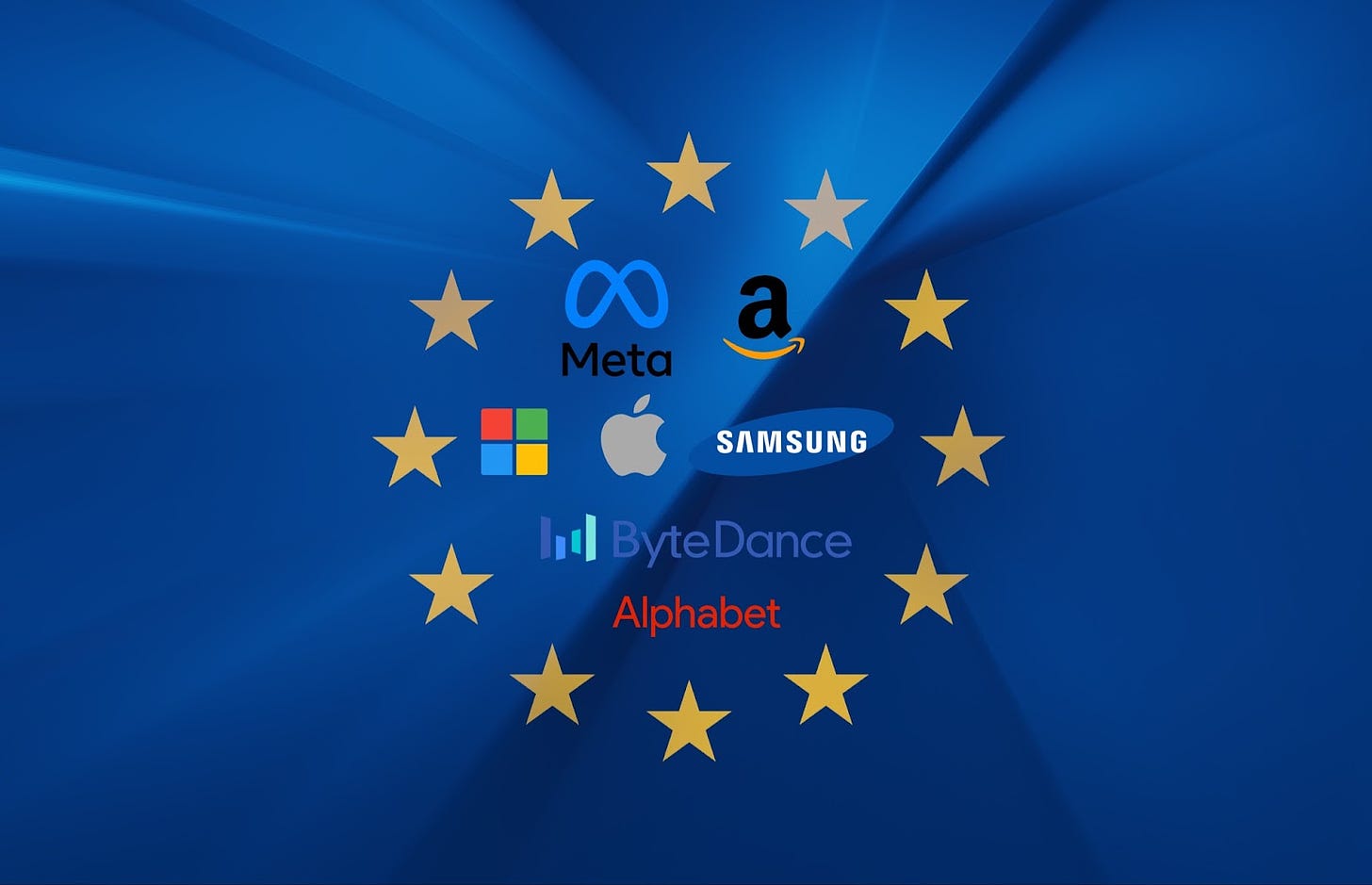Potential Gatekeepers Under DMA Designated
But Also — Rule of Law, Agriculture, Textile Waste, Trade
Hi! This is Monday, 10 July 2023, and here’s the your shot of news from the heart of the European Union to start the week. Feel free to share this newsletter with friends and colleagues, and follow us on Twitter and Linkedin.
The Briefing
The European Commission has identified seven potential gatekeepers under the Digital Markets Act (DMA). Large digital companies had until 3 July to notify the Commission of their platform services and number of users.
BACKGROUND • The DMA imposes do’s and dont’s on gatekeepers to make digital markets more "contestable", i.e. to limit the exploitation by digital giants of the powerful network effects inherent in digital.
The DMA creates two separate classes of players within the digital world, applying only to gatekeepers specific rules related to their outsized importance in the market — "with great power comes great responsibility" as Spider Man, another important web player, says.
For example, gatekeepers will have to ask for users' consent to share data between their different services, allow the uninstallation of applications installed by default, or ensure that their services are interoperable with as many devices as possible.
The obligations of the DMA apply to “core platform services” (CPSs), such as search engines, social networks, or operating systems.
The Commission must designate as gatekeepers are digital platforms operating "core platform services" and meeting a series of thresholds:
A turnover of at least EUR 7.5 billion in the last three years or a valuation of EUR 75 billion; and
At least 45 million monthly active users (MAUs) and 10,000 business customers over the past three years.
THE LUCKY ONES • The list of potential gatekeepers unveiled by the Commission is tentative. The EU’s executive branch has 45 working days — by 6 September — to formally designate gatekeepers after they have notified their core platform services.
The lucky ones would be seven, for the moment:
Alphabet
Amazon
Apple
ByteDance
Meta
Microsoft
Samsung
OUR TAKE • The list is finally composed of five American, a Chinese, and a Korean company. No European company should be regulated by the newly-minted DMA. It has sometimes been said that Spotify, SAP, or Zalando could be potential candidates for designation as gatekeepers.
Enough to continue to feed accusations of legal activism made on the other side of the Atlantic. The U.S. government, in agreement with Big Tech, has repeatedly described the DMA as an anti-American trade weapon.
Between the GDPR and the Max Schrems saga, the DMA and the DSA, the AI Act and the Data Governance Act, U.S.-based tech firms have been the main recipients of European regulatory power — the famous "Brussels effect".
The list of potential gatekeepers is also cause for concern about Europe's inability to nurture its own champions. If regulatory power is one thing, it cannot sustain itself without continued innovation — the example of China’s role in setting 5G standards being a good example.
THREADS • Last week, Meta launched Threads, its alternative to Twitter, in a hundred countries, including the UK. But the service is not accessible to European consumers. The same was true for Bard, Google’s competitor to OpenAI's intelligent bot Chat GPT. Both Meta and Google explained that their decisions were partly justified by the legal risks of launching new products in Europe.
It cannot be ruled out that this delay is in part a negotiation tactic by tech companies. However, it would be damaging if the DMA were ultimately a brake on competition, even if the said competition is to happen between the digital giants of this world.
In Case You Missed It
RULE OF LAW • On 5 July, the Commission published its 4th annual rule of law report. The purpose is to take the pulse on the rule of law situation in the Member States and to make recommendations.
While the Commission estimates that "65% of last year's recommendations have been implemented", it notes that "systemic concerns remain in some Member States".
It won’t come as a surprise: the report particularly blames Poland, which the Commission accuses of failing to make any progress on several recommendations made the previous year on judicial independence and freedom of the press. From a judicial point of view, a recurring request of the Commission is to separate the functions of Minister of Justice and Attorney General.
A recent law on combating Russian influence also worries the EU’s executive arm, which worries it could be used to weaken opposition and reduce political pluralism.
The European Commission stills withholds €36 billion in loans and grants awarded to Poland under NextGenerationEU for breaches of the rule of law, together with cohesion funds blocked under the Conditionality Regulation. Poland is the largest beneficiary of cohesion funds in the European Union.
AGRICULTURE • On 5 July, the Commission proposed a new package of measures for the agricultural sector. For the EU’s executive arm, the aim is to complete the Green Deal as soon as possible, less than a year before the European elections.
In the most controversial measure of the package, the Commission intends to liberalize the placing on the market of new genomic techniques, considered useful to increase the resilience of the food system because they are more resistant to climate change and require fewer pesticides. They differ from Genetically Modified Organisms (GMOs) by more targeted, precise and rapid modifications.
The Commission's proposal pleases neither the right — which is turning increasingly hostile as the Green Deal unfolds — nor the Greens and environmental NGOs. Manfred Weber, the leader of the European People's Party (EPP) in the Parliament, has publicly stated that he will oppose any EU legislation that drives up food prices and threatens farmers' livelihoods.
While some NGOs stress that this is a "good first step", many still consider that this package is not up to the task because it is too minimalist. In particular, they criticize new genomic techniques as they could increase the stranglehold of large industrialists on the agricultural sector and threaten non-GMO and organic production.
TEXTILE • The Commission has also proposed new rules to make the textile industry financially responsible for the entire life cycle of clothing and footwear, as is done for electronic equipment.
The EU aims to promote a more sustainable and local management of textile waste with better sorting, reuse and systematic recycling. However, negotiations are expected to be difficult with the European Parliament, which wants to ban fast fashion, and the reluctance of member states to expand the number of sectors of the circular economy.
TRADE • As China initiates retaliatory measures on two rare metals, talks between Brussels and Washington on steel and green hydrogen have stalled.
In October 2021, the Biden administration suspended tariff barriers put in place by Donald Trump on European steel and aluminum. This truce is temporary, and the two partners have until October this year to reach an agreement on the creation of a new "green steel club" to avoid the automatic reinstatement of US tariffs.
However, negotiations have stalled: rejecting the idea of an ad hoc mechanism, the European Commission would like a transatlantic response based on the carbon border adjustment mechanism (CBAM) aimed at aligning carbon-intensive imports with the existing emissions trading scheme for the EU’s internal production. This solution is hampered by the absence of any American equivalent to CBAM, while the alternative proposed by Washington is considered by the EU as manifestly incompatible with WTO law.
On the green hydrogen side, tensions between Brussels and Washington are also high. While a new billion-dollar regional clean hydrogen hubs plan comes on top of the financial incentives of the Inflation Reduction Act (IRA), the chairman of the European Parliament's International Trade Committee Bernd Lange denounced subsidies "manifestly illegal under the WTO" and called on the European Union to take anti-dumping measures.
Caught in the flea war between Washington and Beijing, the European Union is struggling to avoid the polarization of trade on this strategic value chain. Beijing has announced export controls on gallium and germanium, two rare metals on which the production of semiconductors, solar panels and optical fibers depends.
For the time being and according to Beijing, this warning shot is of general scope. Nevertheless, some might see this as a thinly disguised political signal, coming a few days after the Dutch government's announcement of of an export framework for ASML’s ubiquitous machines.
Tweet of the week
Pablo Pérez of the European Union Intellectual Property Office shares with us a moment of anthology — four years old already — of the European Commission's press conferences. Click on the tweet to read the video.
What we’ve been reading
A briefing by Hosuk Lee-Makiyama and Joses Wong published by ECIPE analyses the state of EU-ASEAN relations.
Also from ECIPE, a further warning by Oscar du Roy, Fredrik Erixon and Oscar Guinea that the gap between Europe and the U.S. in terms of economic dynamism continues to widen at an alarming rate. "If the trend continues, the prosperity gap between the average European and the average American in 2035 will be as large as between the average European and the average Indian today."
Bruegel has published a new book in his Blueprint series, Sparking Europe's new industrial revolution: A policy for net zero, growth and resilience, edited by Simone Tagliapietra and Reinhilde Veugelers.
Francesco Nicoli, Kamil Sekut and Giuseppe Porcaro take a critical look at the latest developments in the European space industry in an analysis for the think tank specialising in economic issues. To stay informed on the topic, we recommend reading Andrew Parsonson's Europe in Space newsletter.
This edition was prepared by Guillaume Renée, Kimia Vaye, Maxence de La Rochère and Augustin Bourleaud. See you next Monday!




